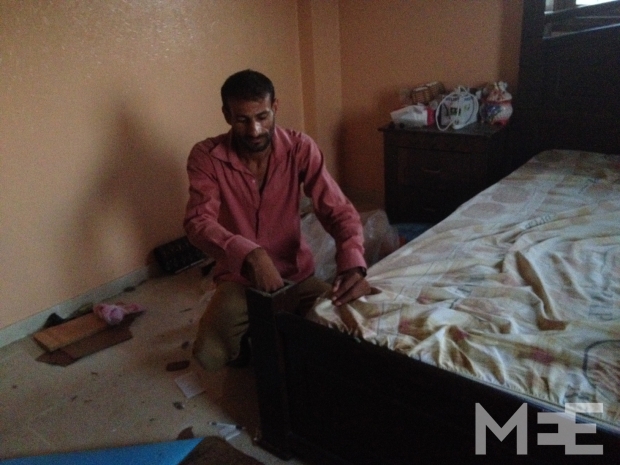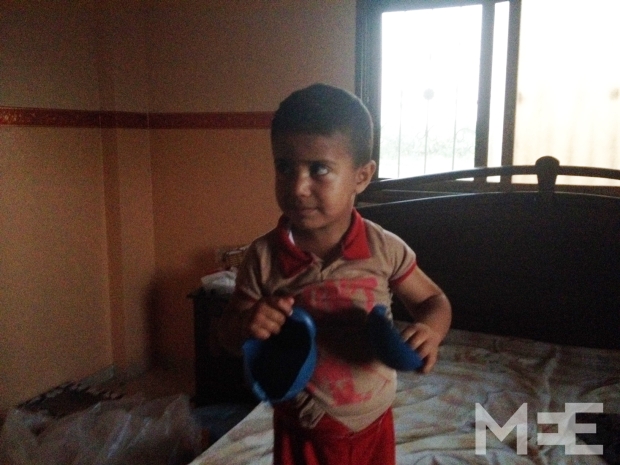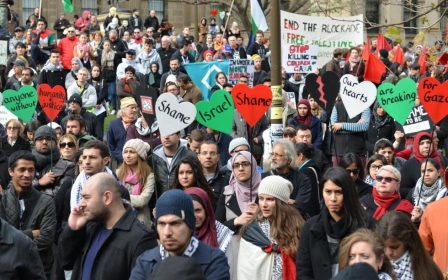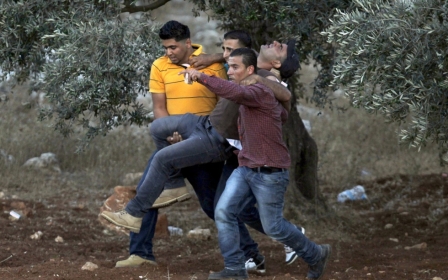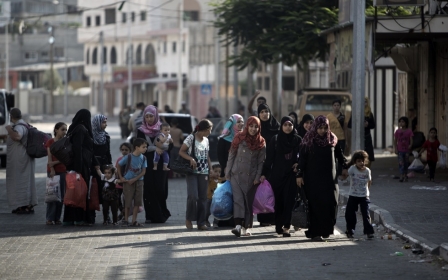Gazans return to looted homes, dead livestock
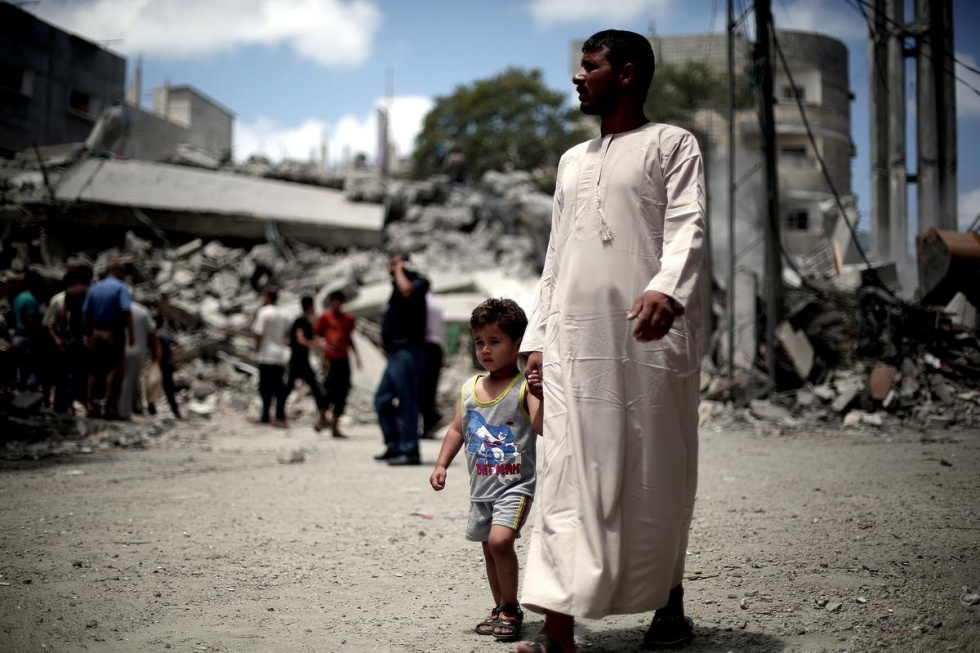
KHUZA'A -- The beautiful, dark yellow-colored villa of Al Najjar appears to be in pieces. It’s the very first home in Khuza’a, the closest Palestinian home to the Israeli tanks on the border with Gaza — and the first one Israeli troops broke into two weeks ago.
“They were here, they destroyed all my belongings, windows, front door, lamps furniture and bedroom, and stole the money I’d saved,” said Mohammed Hussein al-Najjar, 35.
The claims of Najjar were met and checked by Middle East Eye when we went to verify his details and inspect the damages.
Al Najjar walks us through his villa, lying just behind another large villa where his cousin lives with his wife and children. There are no bullet holes in the damaged door, but it seems the door was broken open by metal instruments and the multilock destroyed.
“They opened the kitchen vacuum bag and turn the sofas upside-down to cut through underneath them," Najjar said, as he inspects the massive damage caused to the villa.
His kitchen is in a mess, onion boxes are thrown around, his dishes are destroyed, the refrigerator door left open. In the bathroom, the toilet seat is totally destroyed as water pours out into the living room. A soldier seems to have forgotten his sunglasses and, scattered around are bits of bread and strawberry jam among bags with Hebrew writing on them.
Najjar inspects his bedroom. He doubts that they slept here, but he says a hole that he carved out of the left-hand side of the bed was opened by force.
“Come, I will show you my bedroom where I had my savings," he said. “I designed a hole in the side of the bed—no-one would think to look for money there—not even my wife."
When the Israeli troops broke into his house, one soldier asked him to hand over the key to his chicken farm nearby, one Najjar always kept in his makeshift safe in the leg of the bed. Najjar gave it to the soldier, inadvertently revealing the location of his safe.
The next day, the same soldier returned the keys, before ordering Najjar, his wife and children to leave.
“After 12 years working in the chicken-farm business, I saved $40,000 to expand the business to another area and hire my relatives," Najjar said.
When he and his family heard about the 72-hour ceasefire, they went home but on arrival found the $40,000 gone. He doubts if any Palestinian would have known the money was there, and his family was the first to arrive back.
As night falls, no sign of life is left in Khuza’a, east of Khan Younis. A resident tells MEE he is hungry. A neighbour tells him the local falafel man has gone and has taken his business with him.
The loss to Mohammed Al Najjar is not just his savings: forced to stay away for seven day, his chickens went without food and died.
The Najjar family, like most in Khuza’a, have a different life from the rest of the community. Many of the families here were the first to arrive in Gaza in 1948 after the Arab-Israeli War and the creation of the state of Israel when an estimated 700,000 Palestinians fled or were expelled in what is called the Nakba, meaning catastrophe in Arabic.
Families like the Najjars bought their land very cheaply at the time because of its close proximity to Israel. Today, the land is now worth millions of dollars, but the families hold down similar jobs to other Gazans. Still, they have been able to build more expensive villas hardly found anywhere else in Gaza.
“We went through almost certain death here, with Israeli gunfire," Najjar said, while putting his hand into the empty hole in the bed leg.The make-shift safe was protected with a lock, the remains of which lay on the floor of the dusty room this week.
Najjar had no option but run to the International Red Cross Committee who said they were assessing damages, and that he should return on Sunday.
“They told me to find an Israeli lawyer to litigate this in Israeli court," he told MEE.
Israeli officials say they will open investigations about such claims. Mohammed Al Najjar doesn’t expect much from these investigations, but he said he is not going to let this go, but is now starting to litigate the case.
His case of alleged theft by Israeli soldiers is not the only one in Khaza'a and is similar to others being told by Gazans living in towns near the border where troops were concentrated during the ground invasion.
His cousin, Baker Al Najjar, 29, also returned to his home this week - after he was forced to undress down to his underpants and was taken by Israeli troops for five days - to find it had been vandalised.
He believes Israeli soldiers raided a cupboard where he had stashed $2,000 and a certificate to allow him to marry his fiancé.
As a farmer Baker, is better off than his cousin—he worked hard to save the $2,000 he had in his cupboard. But he found the cupboard vandalised and the money also gone.
“The money the soldiers stole was money I’d been saving for our wedding next September," Baker Najjar said.
In the same neighborhood, on the outskirts of town, stands Ghaleb Al Najjar, 34, who runs a falafel restaurant that competed with the other falafel man who has fled. Najjar developed the habit of saving 10 Israeli shekels every night in coins. His money has also disappeared.
“I kept this money as emergency funds, in case my three children had any health issues,” Najjar said, adding “even my child’s savings were looted by Israeli troops”.
The blue plastic teddy bear bank belonging to his child, Mohammed, was broken open and coins looted by Israeli troops, he said.
Najjar said he does not mind going to court, even if he has to save more coins from his falafel business to get an Israeli lawyer.
“No rights are lost, as long I am alive and demanding them," he said.
Middle East Eye propose une couverture et une analyse indépendantes et incomparables du Moyen-Orient, de l’Afrique du Nord et d’autres régions du monde. Pour en savoir plus sur la reprise de ce contenu et les frais qui s’appliquent, veuillez remplir ce formulaire [en anglais]. Pour en savoir plus sur MEE, cliquez ici [en anglais].


